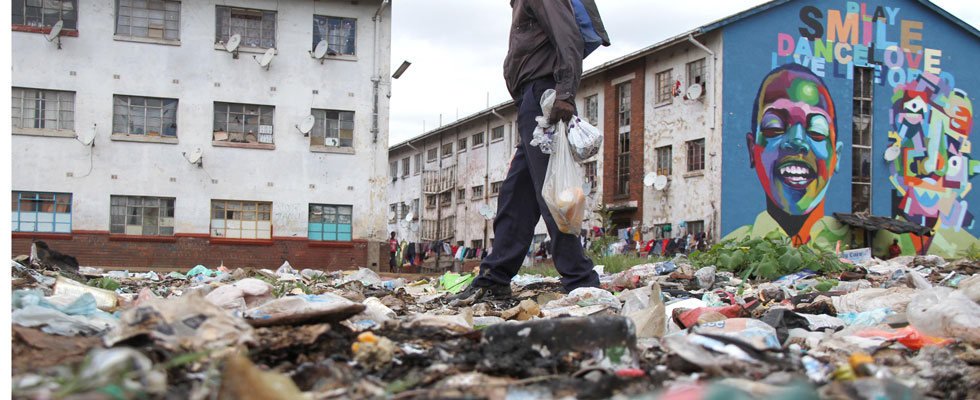
While the current Parliament is winding down, we should be asking the honourable members what they have been doing during their five years on those green benches.
By Fr Oskar Wermter SJ
At present they seem to be full-time engaged in faction-fighting and battles to hold on to their seats and accompanying benefits.
As would-be MPs fight it out in the primaries, we should be grilling them about their knowledge of the real problems of the people they want to represent in Parliament.
Have they done their homework and studied water and sanitation in Chitungwiza, public health in cholera-ridden Tafara/Mabvuku and housing in Mbare?
Another five years have passed without any action taken about the Mbare hostels.
“The traditional family structure has simply broken down and social ills such as prostitution are rife. The scale of squalor, poverty, overcrowding and dilapidation in the Harare City Council’s Mbare hostels is frightening” (from a “slum report” on Harare).
The city council has certainly tried. But so far all attempts came to nothing because political opponents could not tolerate that their rivals should succeed where they failed.
- Chamisa under fire over US$120K donation
- Mavhunga puts DeMbare into Chibuku quarterfinals
- Pension funds bet on Cabora Bassa oilfields
- Councils defy govt fire tender directive
Keep Reading
Like a steamroller, political infighting crushed all concern for human suffering and civic responsibility.
These hostels are remnants of Rhodesia, reminding us of its discriminatory policies that barred families from living with husbands and fathers.
“The advent of independence saw the lifting of the colonial migration laws and inadvertently the influx of population to these hostels” (‘slum report’). “One would have thought that the healing of these social ills would be “unfinished business” for our “liberators” to tackle.
Alas, power politics and rivalries do not permit this.
The political class play their games while women and girls, even in the “leafy suburbs”, walk the streets with buckets on their heads looking for water.
Such leaders do not even know the plight of the common person: when the lights go out — for the chefs they just don’t go out — they switch on their generators, while the rest of us remain in the dark.
If that is so, then we need a new breed of leaders.
“Examine whether the candidate or party you want to vote for is interested in your needs as a community . . . A good leader should have respect for human dignity. All human rights such as the right to life, decent accommodation, freedom of worship etc, are based on the need for respect and promotion of human dignity” (Catholic Bishops’ Easter message).
New leaders will be ashamed when confronted with the life-threatening dirt and squalor of Magaba, Shawasha and Nenyere Flats.
They will know that low-cost housing for the low-income earners the world over is not profitable for business, so public authority concerned about the common good of the nation and decent living conditions for everybody will have to come in.
Knocking down the hostels is not the answer. You need alternative accommodation before you can rebuild the condemned flats. You need to know exactly who has a genuine claim to be housed in Mbare. All this is not easy.
You need dedicated, selfless servants of the people to do this, with a passion for working with those who live in the shadows. That is nothing for careerists merely seeking the limelight.
There are people prepared to make sacrifices, to save cent by cent, dollar by dollar for their “dream house” which may be only a very modest little brick cottage. They are ready “to house themselves”.
But they need the right conditions.
By-laws have to be adjusted, loans must be available and, most importantly, land has to be set aside for serious home-builders and be serviced to have access to sanitation, water and electricity.
If such new homes are finally ready for families to move in, their owner-builders can celebrate a triumph: they will have overcome not just technical and administrative obstacles, but they will have achieved a moral victory too: over selfishness and distrust.
Home-building for low-income people will always be done co-operatively and communally; over greed and corruption, because so many are bankrupted by demands for bribes; over dirty politics because so many party bosses exploit the plight of the poor and give building plots only to loyal clients; over fatigue and despair, because without hard work and self-discipline, you soon give up.
Global humanity is so proud of its technological achievements. But our pride is marred by those ugly scars on the face of the earth, known as favelas, slums or squatter camps. We have the technical means to transform them into environments “fit for human habitation”.
But do we have the communal spirit, the solidarity and sense of responsibility for our neighbour to apply our technical skills and use our resources to make the face of the earth beautiful by creating living space where children can play without catching deadly bugs?
Let us ask our Parliamentary candidates whether they share this vision and are prepared to work for it.
If they cannot convince us that they are, then we are not interested in them either.











